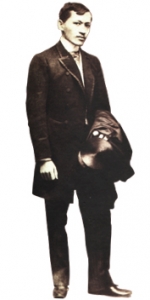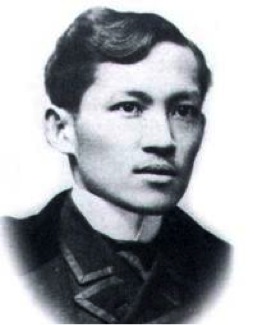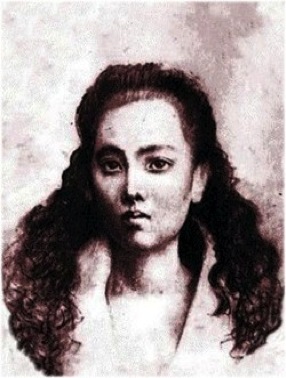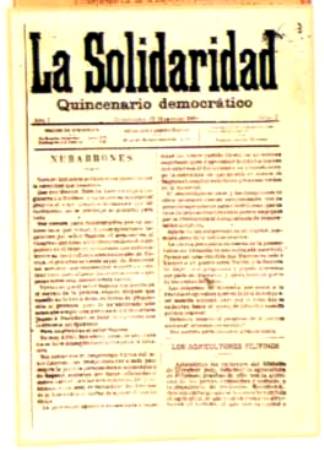“A Kiss from the Philippines”, published on July 15, 1890 in the La Solidaridad by pen name,
Taga-Ilog
It was a hot day in July, from the platform of the station of Mediodia many persons walked silently about while they waited for the arrival of the Express from Barcelona.



Leaning on my cane, I did not take my eyes of the road where the train was expected to appear. I became an unexpected guard, attentive to all the signs.Suddenly before 12 o’clock came, a long electric bell sounded; there followed the ringing of bells, employees ran hither and thither, the baggage boys pulled their carts and on the platform everybody moved noisily; everybody walked rapidly, they ran amidst shouts of the crowd and of the porters; impatience was depicted on their faces; the people looked at the silhouette of the machine which was approaching from a distance.
There he was; from the window of a coach, he was making signs with his hands. Who, you ask? Well, my friend, my former classmate, my fellow-countryman who has just come from the Philippines— Silverio Domingo.
He was smiling; his face looked cadaverous; his pallied cheeks had change to olive due to the heat of the voyage and he looked thin —effects of a forty- day trip across oceans which are hardly pleasant, under a burning sun which dries up everything.
What a tight embrace we gave each other.
“Dear fellow, how are you? How are our friends, your family, So-and-So? Is the country as backward as before?”
And to the questions came the replies and with questions and answers, memories of a faraway land, of home, of family and lastly, of a young woman who, when we left, hid her affectionate tears behind a handkerchief.
I was impatient. I wanted to know something about her. I expected Silverio to give me news of Loleng. Unable to contain any longer the anxiety in my soul, I finally asked him, affecting indifference:
“And our friend Loleng, is she well?”
“I know how eager you are for news of her; dear man, she is now more beautiful than ever; every time we saw each other, she often talked of you, trying to find out if we wrote to each other , if you like staying here, if you have many sweethearts, etc.”
“Say, tell me, is somebody courting her?”
“Many, very many.”
“Who are they?” I asked quietly, trying to hide the surge of jealousy which I felt in my breast at an unknown rival.
“But she does not like anyone of them.”
They left the station and proceeded to Rizal’s house —that is to the house of his fastidious landlady where Silverio will be staying.

The happy chatter of Silverio buzzed in my ears, but with all apologies to him, my imagination wondered somewhere else. I was dreaming of that open-hearted girl with dark and soft skin, with the oval face which had bright eyes whose reflections seemed to mirror a heart who knew how to love; of that mouth which though wide showed clean, white teeth at every smile; of that form and of her mannerisms which show something native that makes us exclaim enthusiastically:“What a dear this girl is, although she does not have a penny.”
When they arrived at the house, Silverio made himself as comfortable as possible. They had lunch and Silverio had a nap.


I went to my room to think of her; her memory and the news of Silverio filled me with love and affection.I was seeing her ride a spirited horse on the Malecon drive; I was looking at her coming out of her swim at the beach near Ermita, when the waves disappeared silently ashore and a vaporous cloud covered the wide horizon; at her dressed in white – comfortable and rested, without the slightest stain, with her hair down reaching down below the waist, with a skin still fresh spreading round her an aura of youth; the perfume of the tang-lad ( a scented-herb) and of the freshness of the skin which enhances it. I was looking at her during the fiesta of Sampalok, four years ago, in the house of Capitan Ambrosio, dressed in mestiza (the native costume) with the transparent piña and satins seeming to wrap her with vaporous gauze; with flushed cheeks, breathing hard, stifled with heat, fanning herself, seated by a table in the corridor close to the windows after a dance with me in a measured Boston.
In those corridors or galleries hardly illuminated by the lights of the hall, there we said goodbye to each other. It was the last night I was spending in the Philippines. My luggage was ready, my passport was in my pocket; my poor mother had cried silently, and on the next day, I had to go, go far away — to Paris, Spain, Europe and God knew where else! On the map the distance which I was marking with a toothpick and which I knew from memory seemed very short; but in reality those small distances meant many days, much water in-between, many new places to cross, a thousand disappointments and troubles.
Seated — Loleng and I — we remained silent; it did not seem that the same thought made as sad. We did not dare look at each other for fear of seeing in each other’s eyes what we felt inside. She was absent-
mindedly biting at her handkerchief; I was drumming my fingers on the arm of the chair, both of us looking at Alix Street lighted by small paper lanterns, by the beams of light which made the fronts of houses flush with gold. The large crowd passed by noisily and happily; the carriages were filled; spectators followed the passing of the long line of carriages. Everything was noise, glad shouts, good humor, fun ….only we, amidst that fiesta, felt sad because of the impending separation.She continued to fan herself and I, just to start a conversation I longed for, took her fan and started fanning myself.
“With whom are you going tomorrow?” She asked me sadly, looking directly at me.
Her voice sounded like a sigh, a sob. “Yes, tomorrow I am leaving and you know how much I regret having to go. But do not be afraid,” I told her eagerly in the passionate outburst of a youth of twenty, “I shall never forget you. Your pure image,” I continued poetically, “will be with me everywhere I go. I shall always be a faithful lover, etc.”I was so affected that I forgot all the loving phrases I had studied moments before. That was pure romanticism, but ridiculous or not, I certainly expressed what I felt then: grief; I was much disturbed and although somewhat incoherently, I made myself understood.
That night during the dance, I begged her to grant me a moment so that we could talk and say good-bye to each other. That happy moment had come; it was necessary to take advantage of it, not to lose a single minute, not to waste a second. And how many things I had to tell her! I wanted to tell her not to love another in my absence; that I would love her always; that I would come back in two or three years, the time needed to complete my course, to be a doctor and round up my studies and preparation by travel; that though in Spain there might be bigger and more beautiful eyes, black or blue, white or rosy skin, exciting or provocative forms, I would always adore her — the demure combination of a dignified dalaga; that I would try not to be lost, that I would be a model young man; that I would sleep, like I did in Manila, at a stroke of ten so as not lead the licentious life of a libertine; that would attend mass every Sunday and days of obligation; that I would never be a mason and that I would never write against the friars; in short, I was ready to sacrifice myself for her— the dream of my life.
Promises which are made because we forget their value in those moments when the sacred fire of love and the ardor of youth give us strength for everything, even to becoming curates when we are disappointed in our loves.
All my hurry was for the purpose of giving her a kiss that would seal in a less platonic way our good-bye and our love; a kiss on those lips or on those pale cheeks of an anemic young woman. It had been three weeks since I had asked it day after day. At first we quarreled; she cried and brushed me off indignantly and told me if I liked her, I would never speak of that. Days later, we made up, which to me was a real victory. I went back to my insistent demand. She told me that that was an insult; that she could not grant it. More days passed, I hinted at it again and she, inclining her head a little, her eyes down and covered by those long lashes of hers told me:
“NO, to that; no, to that.”
I was going mad; to go away, to leave her there, to adore her without even giving her a kiss — one single kiss, what would my friends, if they should find out, say? That my love was platonic, romantic foolish; that I was stupid and a fool? My reputation as a lover was at stake and it was necessary to try everything to achieve my desired goal.It would have to be done that last night and instincts of the petty human beast in me, made me think of kissing her when she was not expecting it. With or without consent, the burning issue was to kiss her and just as we would say in a novel: the affair was a matter of life and death.
I made all imaginable promises. I swore to love her even after death! Judge for yourself if I had been eloquent, persuasive and in love!
So much so that I saw tears in her eyes and I succeeded in getting her to let me hold one hand— the right hand which I pressed between mine—that hand with lovely fingers which when she extended to me after she came from a bathing produced in my own hands a cool and pleasant feeling. Now it fluttered nervously in answer to my soft pressure. I took advantage of the romantic situation to let her know, perhaps for the twentieth time, my simple and ardent wish: the blessed kiss before leaving. I believe I had been boorish and clumsy.
“Do you wish to annoy me?”
She asked feigning annoyance;
“I already told you —no,”
She added sweetly and fondly and later, whispered softly with her mouth close to my ear, so close that I felt her breath on my face—
“the day we get married, if God should wish it, then I shall give you one, but one only —long and hard.”
I saw her face turn the color of makupas.Loleng thought she would shock me with those words spoken in such a mysterious way; it was my hope when we should get married —one, only one, but long and hard, almost binding. It was such a faraway possibility, like touching the moon. It was a sure thing that I was leaving without achieving my long-sought for dream.
With almost all hope gone, I asked her to permit me to kiss her hand.
“When you should ask for it,” —“then,”
and she withdrew that tiny morsel of her which just as I said, I held between my hands.She was very talkative, something which was unusual. She told me that I should be a good Christian; that she hates Protestants; that I should pray upon rising as well as before sleeping; she gave me a scapular of the Virgin of Peace and Good Voyage so that I might have a pleasant trip and she said again that I should be wary of the woman here.
She said that she wanted to cheer me up because, at least, she would be with her family, but I would be without mine, alone in the world of perdition, left to my own resources; to remember what Father Bertrand and Father Solucia told me, the advice of Uncle Quicoy who had been in Europe.
And she asked me if I like her, I replied:
“More than you think.”
“But I do think very much.”
“Well then, very, very much; I adore you,” I told her believing I would go to extremes and arouse in her a surprising effect.
“One adores the Virgin,” and “I am only liked.”
Loleng noticed my sadness and to please me she talked of the life she was planning to have when I should be gone to Europe. She would go to dances and feasts too please her mother and so that nobody would know of (our relationship).
“How trying having to do all these things and pretend happiness when one is sad.”
Loleng noticed my sadness and to please me she talked of the life she was planning to have when I should be gone to Europe. She would go to dances and feasts too please her mother and so that nobody would know of (our relationship).
“How trying having to do all these things and pretend happiness when one is sad.”
I told her again that she should not make sacrifices for me; that she should go on as usual, but she insisted that she would in exchange for what she expected I would do for her.Afterwards she detached a rose she had on the twin end of the pañuelo— a flower she had carried all night close to her pure and hidden form and which had been impregnated by the perfume of her body; and giving it to me said:
“For you. It is from the potted plant which you bought for me in Binondo Plaza one Sunday; that rosebush which had roses so well glued by the peddler who wish to deceive me. Do you remember it?”
If I remember it! How could I forget when it cost me the last twelve reales Fuertes which I had then in my pocket?I thanked her profusely and she went on:
“Shall we bet that you will not be bringing the rose back to me?”
I was going to say that we should bet a kiss on it because I was completely sure that I would easily win the bet, but I thought of how late, very late, I would be receiving the winnings and so, I was content in reassuring her that I would let her see the flower when I return.

When I got to the house that evening, I kept the flower very carefully between the pages of a book —the Materia medica which was on top of my desk. It still has between its pages the only souvenir of my love; it travelled with me; it was the cause of many troubles and yet it was still to me very dear, very likeable, much loved because it is the sanctuary of the souvenir from my sweetheart. How often have I kissed fervently pages 172 and 173 where the flower is! How often have I looked lovingly at its mottled leather cover!
From the very vivid memories which filled Rizal‘s whole being with tenderness, he was distracted by the presence of Silverio. He came to his room to continue their talk about the Philippines, animated by the fresh news to which he had been witness.
SILVERIO – “What are you thinking of, dear Pepe?”


JOSE RIZAL – “ My dear fellow, I thought of Loleng this afternoon with the news you brought me; I dreamed of her; I recalled her as she was four years ago when in my teens I love her with all the illusions of youth, when she was fifteen and I, nineteen. Her memory lingered but was dying out; I would not think of her sometimes for a month. Ingrate that I am, but now her image returns vividly in my mind, like a star in a dark night and in spite of all the superficialities around me which force me to think of the future, forgetting the interests of yesterday. I feel an extinguishable thirst for pure affection, real, without deceit or lies which will cure the weaknesses of my sick spirit.”
SILVERIO – “You know that your relationship is not a secret to me and this is why she was more open with me than with the others. In dances and feasts she seems to be the same girl you left four years ago—taller, about one or two finger-breadths, a trifle heavier, in spite of her small frame, but paler every day. She told me that she was taking iron and she was going on with sea bathing which seems to do her good. And I told her, purely as a joke, that she should look for a lover to which she remained silent and sad. She seemed to be deep in thought— about you, man, about you!”
JOSE RIZAL – “Do not be stupid, Silverio,” I said tickled at the thought that someone likes me and trying to be modest, I said,
“I do not deserve her.”
SILVERIO – Loleng does not lack suitors: Lopez, Perico Fernandez, Chengoy of Santa Cruz, an employee of the Hacienda, a captain of Artillery, etc. She turned them down.”
JOSE RIZAL – I was bursting with pride; Loleng turning down everybody interested in her: turning down Lopez, owner of a two-hundred thousand fortune: Fernandez, a rich landlord, an employee of the Hacienda with a monthly salary of one-hundred fifty pesos, a brave and courageous captain of Artillery; and I, the obscure doctor, the insignificant writer, a son of a respectable provinciano (one from the province) was perhaps the chosen one. I was feeling puffed with pride; I wanted to leave the room, to run outside, far, very far, to shout to the whole world that Loleng loved me; I was completely happy. I who was until then modest and quiet became proud and boastful.
Two months ago Silverio had been to Antipolo with her and her family for a nine-day stay. She used to bathe in the springs often; they went horseback riding and walking around town, talking often about me. One day, she told Silverio:
LOLENG – I put up candles everyday to the Miraculous Image for something I have been praying for years
SILVERIO – And I told her I knew what she was asking for,
LOLENG – placed her fingers on her pretty mouth to silence me.
When Silverio went to say good-bye to the family, he took advantage of a careless moment when the mother left them alone to ask her:
SILVERIO – “And what do you want me to say to Pepe?”
LOLENG – “Nothing “
SILVERIO – “What nothing?” Shall I tell Pepe you are sending nothing?
LOLENG – “Tell him what I have told you many times.”
SILVERIO – “But nothing more, Loleng?”
LOLENG – “Ah,” “My best regards.”
SILVERIO – “And that he should not forget you, no?
LOLENG – “All right. Give this to him, too.”
She took from her pocket an envelope which contained a dry flower pressed on a piece of cartolina (hard paper). It was the last rose she had worn on her hair, which she preserved to send to Pepe. She kissed the flower and gave it to Silverio who was the carrier of such a precious souvenir.
SILVERIO – “Here it is”
JOSE RIZAL – I got it; I looked for the flower and I kissed the musty petals of that dry rose. On it Loleng had pressed her lips: on it I must place mine. I wanted to breathe deeply of something she had left there. The much-sought for kiss had arrived through it and I wanted to enjoy every bit of it. Loleng kissed the flower to send it to me; the flower was nothing more but a means, the kiss was for me.
During the lapse of forty days, what would be left of the loving kiss place there by Loleng?


SILVERIO – I did a foolish thing,
“Dear fellow, you have to excuse me,” “I have also kissed that flower.”
JOSE RIZAL – “Wretch” I told him in fury.”
SILVERIO – “My dear man, forgive me.” I could not resist it; I confess I did badly, but when Loleng gave it to me, upon reaching the house I also kissed the flower, wet still by the contact of her lips.”
JOSE RIZAL – “Wretch,” I repeated looking at him angrily:
I lifted bloodshot eyes to the crossed swords brightly hanging on the wall whose brilliant hand-guard seemed to form a parry position; but soon in a lucid moment, I took hold of Silverio and thanked him for everything he had done for me. The poor fellow had worked hard and deserved something for his pains,
As long as he did not go beyond the rose. He was my friend and I knew how loyal he was. Completely soothe, I told him:
“Disadvantages of distance; there is nothing more I can do but wait for it. How difficult it is to kiss Filipino women.”
The End

